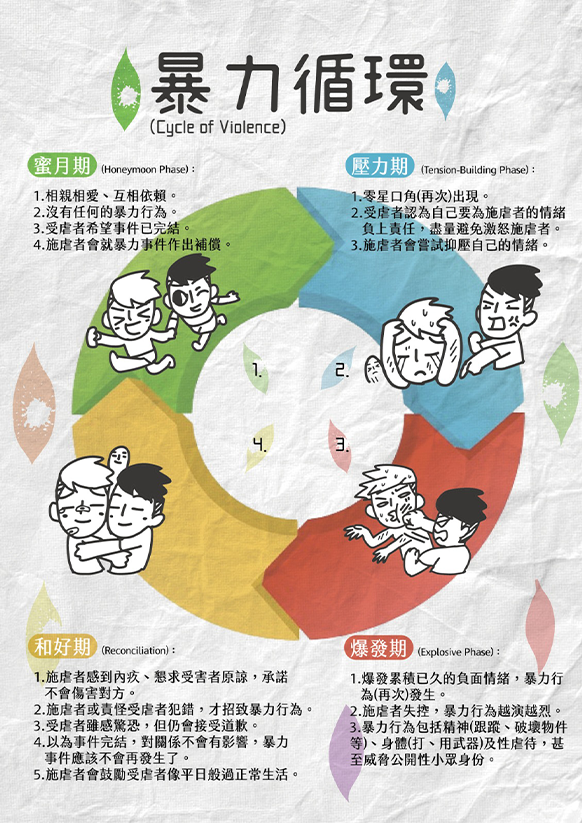
Messages to Sexual Minorities and their Family - Violence in Intimate Relationships
Violence in Intimate Relationships
Violence in intimate relationships does not only exist in heterosexual relationships. It is also common in sexual minorities. Most of the times, people do not realise that they have already fallen victims to violence. This is because many people are only aware of physical violence, but they may have neglected emotional abuse, sexual violence and other kinds of violence.
Besides, sexual violence can occur to anyone regardless of one’s sex, age, educational level, race or social status. Facing enormous social pressure, biases and discrimination, sexual minorities often find it harder to seek assistance when they are being sexually abused. The situation will become worse and violence will accelerate if there is no intervention against the violence in intimate relationships.
These are the three types of violence in intimate relationships.
-

Physical Violence
- Push, punch, scratch or hit you with hands or fists.
- Slap you, kick you or grab you by the throat.
- Threaten or attack you with a knife, a gun or other weapons / dangerous items.
-

Emotional Abuse
- Isolate you from friends and family members. Restrict your social life and friend-making.
- Monitor what you do or where you go or ask someone to monitor you. Request you to explain what you are doing at all times.
- Infringe on your privacy, such as open envelops, read your letters and emails without permission.
- Show extreme jealousy or be dominate over you.
- Humiliate and insult you with foul languages or offensive words.
- Harass you at your school or workplace.
- Threaten to harm you, your family or friends.
- Coerce you into maintaining the relationship with suicide or self-harm.
- Control the finances and request you to bear all expenses of both of you.
- Damage your property.
- Injure your pet and damage items you value.
- Threaten to out you to others.
-

Sexual Violence
- Force you to have sex with him/her.
- Become furious once you can’t meet his/her demands on sex.
- Stop you from engaging in safe sex.
- Injure your genitals and carry out sexual abuse.
Emotional Abuse which is Unique in Sexual Minority Intimate Relationships
Violence can take place in any intimate
relationships regardless of one’s status, sexual orientation and age. Due to
their identity, sexual minorities may experience several types of emotional
abuse which are different from heterosexuals and unique in their community.
-
Threats of Outing
Threaten to out you to your family, co-workers, relatives, friends, neighbours and other important people, in order to achieve what you are unwilling to do, such as requesting for getting back together after break-up.
-
Threats with Conventional Stereotypes of Gender Roles
People usually distinguish an abuser and a victim in a heterosexual relationship by their appearances. For instance, the one who is bigger and taller is usually treated as the abuser. Therefore, a thinner abuser may brainwash a taller and bigger victim into thinking that no one believes that he/she/they is being abused. This also happens in the case of an abuser with feminine gender and a victim with masculine gender , which may hinder the victim to seek help.
Besides, there are the following false
beliefs about violence in intimate relationships in the community of sexual
minorities.
-
Violence in intimate relationships only happens between heterosexual partners.
-
Violence among gays is for the sake of fun. There is not any violence among lesbians.
-
An abuser must be masculine (such as a Butch) while a victim must be feminine (such as Femme).
What do abusers say to make you believe you are far from violence?
- Abusers usually control victims by saying the following words so as to achieve 2 ives.
- To keep the victim close to the abuser and maintain the relationship.
- To fulfill specific personal needs.
-

“I don't hit you, so there is not any domestic violence.”
Many people are aware of physical violence, but they may neglect other kinds of violence, such as emotional abuse, financial control and sexual violence. Other kinds of violence can still take place without hitting.
-

“This is normal.”
Abusers tend to claim and justify that their abusive behaviours are “normal”, convincing you to accept their violence.
-

“It' s your fault!”
Abusers tend to justify the abusive behaviours by blaming the victims for making mistakes in the past, trying to shift the responsibility for violence to the victims. Gradually believing that violence is out of their own responsibility, the victims will not dare to resist.
-

“I will change. I will change…”
Abusers often apologies after committing violence. They claim that they will change. However, this is often followed by another violent act. Repeated promises help them retrieve and maintain the love relationship, yet the problem is not solved.
Vicious Cycle of Violence
After a violent act, abusers often apologise for the violence and promise to change. On the other hand, victims often accept the apology and forgive them.
However, without intervention, a vicious cycle of violence (violence takes place > abusers apologise > victims forgive > violence takes place) will probably take place while the abusive behavior will become more and more violent.

Safety plan
If you are facing violence in your family or close relationship, try to find a safe place first, and then think about how to help. If you're at home, consider taking shelter in a room or toilet that can be locked. Here are some specific solutions you can consider when you think about how to ask for help.
A. Seek help from people you trust
- Seek help from relatives and friends
- Seek help from a social worker
- Seek help from a supporting group
- Seek help from the police
B. Keep calm when you leave home
- Choose a safe place to go, such as a refuge centre or the home of your friends/relatives which the abuser doesn't know.
- Take account of the safety of yourself and people around you.
- Avoid direct conflicts with the abuser.
- Set a suitable time for you to leave home safely.
- Plan a safe and suitable route for you to leave.
- Prepare some personal belongings such as identification documents, money, clothes and drugs.
- Mark down important phone numbers, such as hotlines for rescue and phone numbers of relatives and friends you trust.
- If you plan to stay in a refuge centre, please don’t tell others the address of it. But you may tell your family members that you are safe.
-
Seek
assistance from relatives, friends and social workers.
If you plan to leave home, please pay attention to the followings.

Call TWGHs Pride Line at 2217 5959.
- This is a 24-hour hotline for sexual minorities.
- You can talk to us and seek assistance from us. We are here to answer your questions and we will refer you to other services if necessary.






